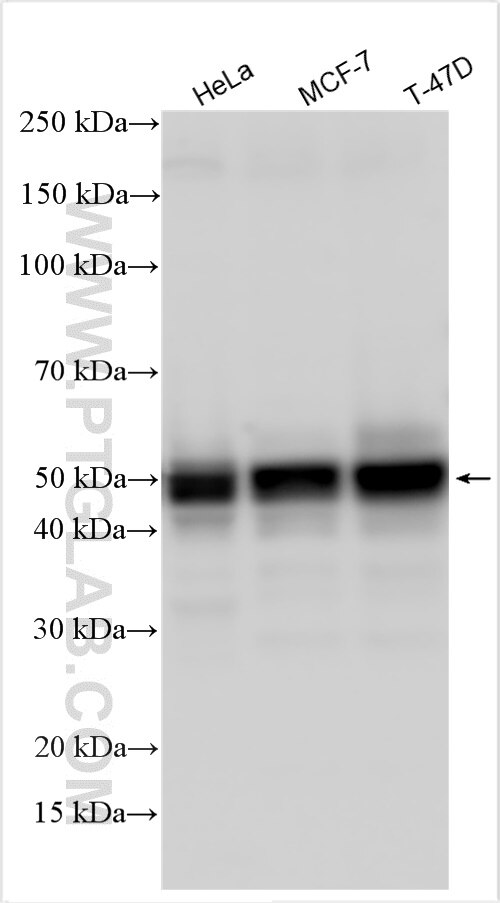SLC9A3R2 Polyklonaler Antikörper
SLC9A3R2 Polyklonal Antikörper für WB, ELISA
Wirt / Isotyp
Kaninchen / IgG
Getestete Reaktivität
human, Maus, Ratte
Anwendung
WB, ELISA
Konjugation
Unkonjugiert
Kat-Nr. : 18891-1-AP
Synonyme
Geprüfte Anwendungen
| Erfolgreiche Detektion in WB | HeLa-Zellen, MCF-7-Zellen, T-47D-Zellen |
Empfohlene Verdünnung
| Anwendung | Verdünnung |
|---|---|
| Western Blot (WB) | WB : 1:500-1:2000 |
| It is recommended that this reagent should be titrated in each testing system to obtain optimal results. | |
| Sample-dependent, check data in validation data gallery | |
Produktinformation
18891-1-AP bindet in WB, ELISA SLC9A3R2 und zeigt Reaktivität mit human, Maus, Ratten
| Getestete Reaktivität | human, Maus, Ratte |
| Wirt / Isotyp | Kaninchen / IgG |
| Klonalität | Polyklonal |
| Typ | Antikörper |
| Immunogen | SLC9A3R2 fusion protein Ag13476 |
| Vollständiger Name | solute carrier family 9 (sodium/hydrogen exchanger), member 3 regulator 2 |
| Berechnetes Molekulargewicht | 337 aa, 37 kDa |
| Beobachtetes Molekulargewicht | 45 kDa |
| GenBank-Zugangsnummer | BC106001 |
| Gene symbol | SLC9A3R2 |
| Gene ID (NCBI) | 9351 |
| Konjugation | Unkonjugiert |
| Form | Liquid |
| Reinigungsmethode | Antigen-Affinitätsreinigung |
| Lagerungspuffer | PBS with 0.02% sodium azide and 50% glycerol |
| Lagerungsbedingungen | Bei -20°C lagern. Nach dem Versand ein Jahr lang stabil Aliquotieren ist bei -20oC Lagerung nicht notwendig. 20ul Größen enthalten 0,1% BSA. |
Hintergrundinformationen
SLC9A3R2, also named as NHERF2, is a member of the Na+/H+ exchanger regulatory factor (NHERF) family of PDZ scaffolding proteins. SLC9A3R2 is needed for cGMP and carbachol-mediated inhibition as well as LPA and dexamethasone-mediated stimulation of NHE3. NHERF1 and NHERF2 are highly homologous structurally to each other but play different roles in the regulation of Na+ and Cl− transport.(PMID: 23612977)
Protokolle
| PRODUKTSPEZIFISCHE PROTOKOLLE | |
|---|---|
| WB protocol for SLC9A3R2 antibody 18891-1-AP | Protokoll herunterladen |
| STANDARD-PROTOKOLLE | |
|---|---|
| Klicken Sie hier, um unsere Standardprotokolle anzuzeigen |


